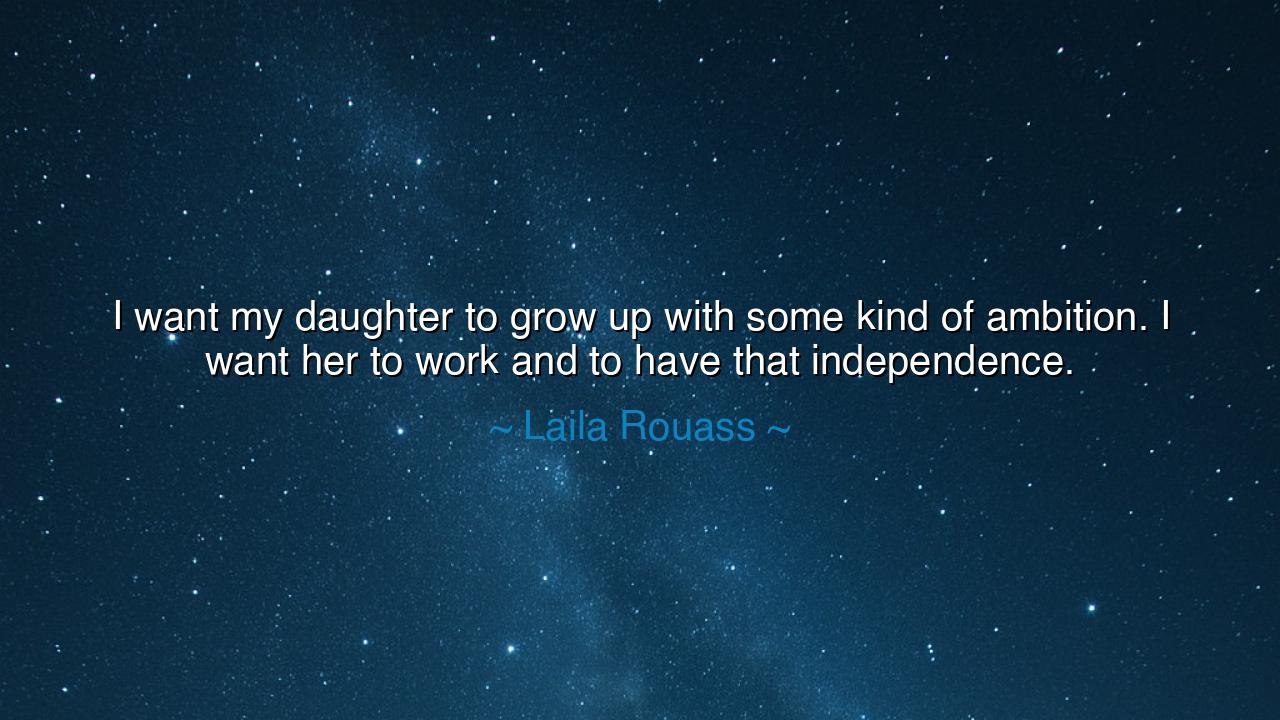
I want my daughter to grow up with some kind of ambition. I want
I want my daughter to grow up with some kind of ambition. I want her to work and to have that independence.






Hear the words of Laila Rouass, spoken not as an actress of renown, but as a mother, a guardian of the next generation: “I want my daughter to grow up with some kind of ambition. I want her to work and to have that independence.” In these words, the fire of motherhood meets the wisdom of the ancients. They are not merely a wish for success — they are a prayer for freedom, for ambition, and for the sacred strength of independence. For every mother who has ever looked upon her child and seen within them the promise of a new world knows this truth: that to live fully is to strive, to rise, to build one’s destiny with one’s own hands.
The ancients taught that to work is not a curse, but a calling — the act that transforms potential into power. When Rouass speaks of work, she speaks not of toil for its own sake, but of purpose, of the joy that comes from creation, and the dignity that flows from self-reliance. She rejects the stillness of dependency and calls instead for a life of motion, of effort, of growth. For a woman — and indeed for any human being — to be independent is to be whole, to belong not to another’s will but to one’s own. It is the quiet glory of being the author of one’s fate.
Long ago, in the land of Egypt, there lived a queen named Hatshepsut, who rose to rule in an age when women were told they could not. She built temples of stone and empires of trade, declaring herself “the daughter of the sun.” Her power was not inherited from a man, but earned through vision, intellect, and work. Like Rouass, she understood that ambition is not arrogance, but the soul’s yearning to fulfill its purpose. In her reign, she proved that when women lead through wisdom and courage, the world itself becomes richer. Hatshepsut’s life was a monument to the truth Rouass now teaches her daughter — that independence is both a right and a responsibility.
And yet, in every age, there are those who would silence such ambition, who would say to the daughters of the world, “Be content to depend.” But dependence, though it may seem gentle, is a gilded cage. It is comfort at the cost of power, security at the cost of selfhood. Laila Rouass’s words cut through that illusion like a blade of light. She calls upon her daughter — and all who listen — to seek fulfillment not through others, but through one’s own labor and passion. True independence, she reminds us, is not given; it is earned through courage, persistence, and the refusal to yield.
Consider also the story of Marie Curie, who toiled through years of hardship and skepticism, her ambition burning brighter than the radium she discovered. She did not work for glory, but for knowledge — for the joy of contributing to something greater than herself. In her work, she found independence not merely of wealth, but of mind. Hers was the kind of ambition that liberates, that shows the world that work is not a burden, but a form of becoming. It is such an example that Rouass invokes when she wishes ambition upon her daughter — not ambition for vanity, but for meaning.
The wisdom of this quote, then, lies in its balance. Rouass does not call for greed or restless striving, but for some kind of ambition — a direction, a spark, a force that keeps the soul alive. She knows that without purpose, comfort becomes decay; without challenge, peace becomes emptiness. To work is to live, to engage with the world as a creator, a builder, a dreamer. To be independent is to know that one’s happiness and dignity do not rest on the gifts of others, but on the strength of one’s own will.
So take this teaching into your heart, O listener: Do not shrink from ambition, for it is the breath of growth. Do not fear work, for it is the crucible in which the self is forged. And do not seek dependence, for even love is richest when it stands between equals. If you have children, teach them as Rouass teaches hers — not to chase wealth, but to cultivate purpose; not to follow blindly, but to lead bravely; not to rely on circumstance, but to rise above it.
And so, let this be your guiding flame: that ambition, when rooted in virtue, is the seed of freedom; that work, when pursued with joy, is the path to wisdom; and that independence, when nourished by courage, is the crown of a life well lived. For the truest gift a parent can give a child is not comfort, nor inheritance, but the knowledge that they are capable of standing tall — self-reliant, strong, and radiant with purpose, no matter what storms may come.






AAdministratorAdministrator
Welcome, honored guests. Please leave a comment, we will respond soon